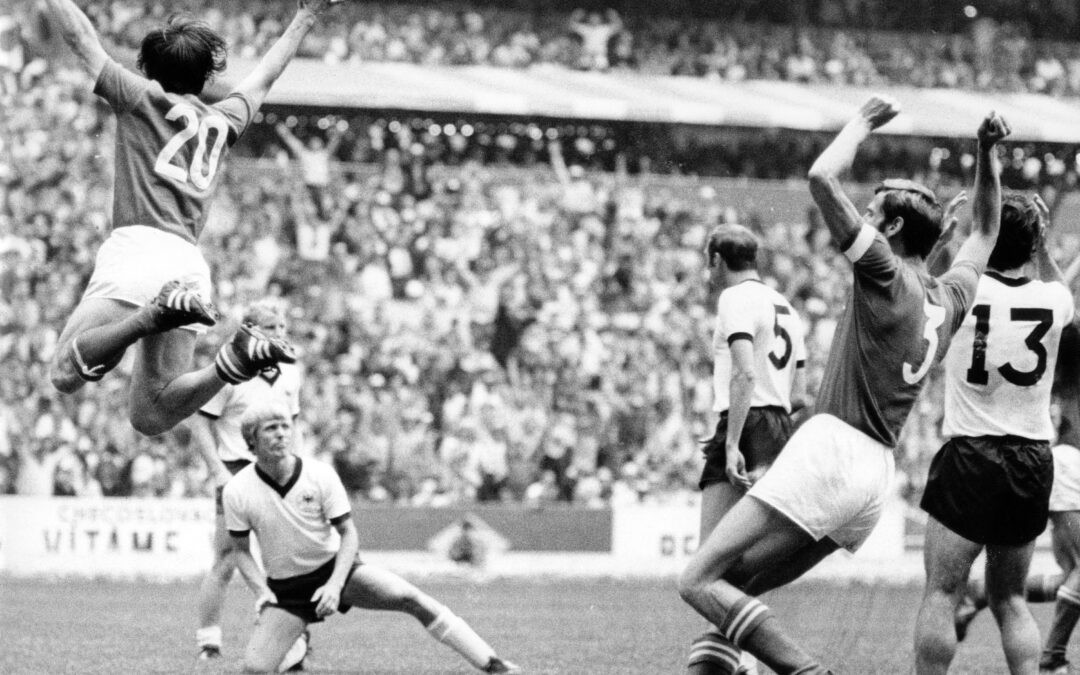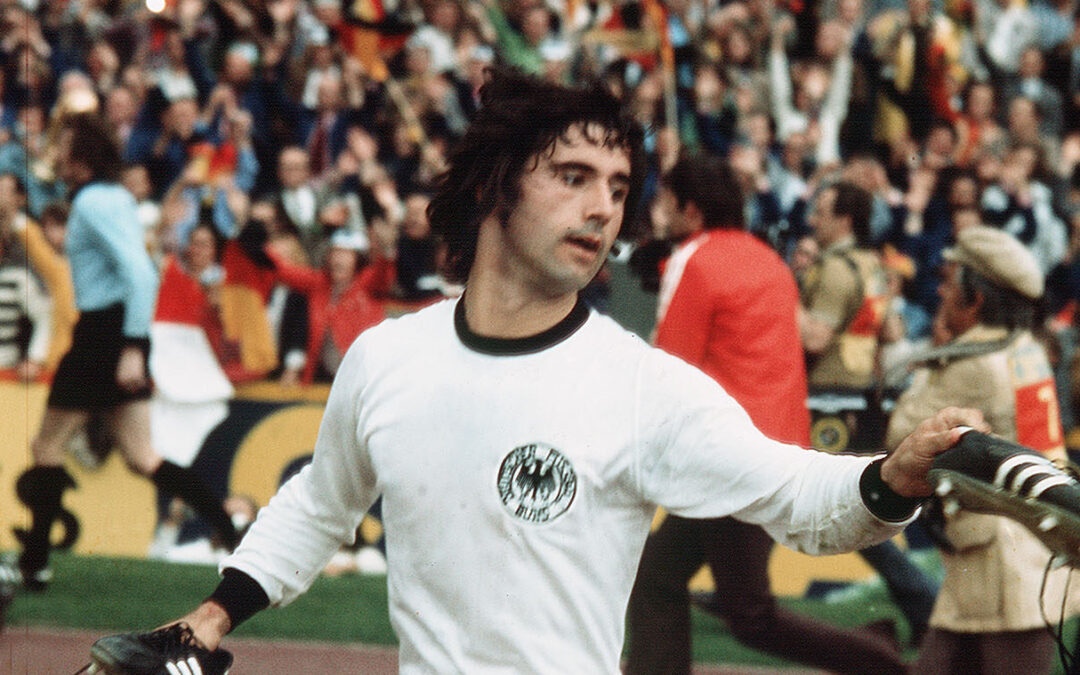
World Cup in Mexico 1970: “Ita-lia! Ita-lia!”
The match of the century celebrates its anniversary. Football has never been more wonderful and terrible than on 17 June 1970: In the Azteca Stadium in Mexico City, they put the arm in the noose of our maimed emperor, and at home we felt like being roped – the screams of joy from the neighbouring balconies became too unbearable as the night wore on.
A few days ago, the head of the sports desk tested my long-term memory and my aptitude for the following text with the question: “Where were you on 17 June 1970?”
All of us know these historical interrogations. Where were you when Neil Armstrong walked on the moon? Where were you when the Berlin Wall fell? Where were you when the planes flew into the Twin Towers in Manhattan?
Where was I on 17 June 1970?
At home in my television chair, like every dutiful German, I was alternately roaring with happiness and cursing with rage.
It was fifty years ago, but I can still see my father in front of me, clutching his heart in the middle of extra time and saying, “I have to go to bed, I can’t take this.” Then he fled, leaving me alone with this most wonderful and terrible football match the world has ever seen.
You have to be Italian not to have suffered permanent psychological damage that night. We Germans will never come to terms with this World Cup semi-final in Mexico City, which began as football and ended as torture. We are like Gerd Müller, who lay on the grass of the Aztec stadium at the end and swore: “I don’t want to see any more of this game for the rest of my life. I would cry.”
Triumph and tragedy have never come closer than on that night. Emotions rode roller coasters and ghost trains, and the incomprehensible is immortalised at the Azteca Stadium with a commemorative plaque to which football fans have bowed like pilgrims in Mecca for fifty years: “Italia – Alemania. 17 de junio de 1970. Partido del siglo.” The match of the century.
The dramaturgy of horror and horror begins in the seventh minute. 0:1, Boninsegna.
Roberto Boninsegna. No one suspects at that moment that this name will soon haunt us Germans in our sleep. That we would meet him again just one year later, on a sad European Cup night when Günter Netzer played the game of his life. With his Gladbach team, the “King of the Bökelberg” knocks the reigning World Cup winners Inter Milan off their feet 7:1. Only a failure of the floodlights could save the Italians that night, or the throwing of a Coke can. The warehouse worker Manfred K. then actually fires it, at the head of Boninsegna, who is making a throw-in. Others swear that the can only grazed his back. The can was empty in any case, but Boninsegna falls over as if struck by an axe. For seven minutes he lay motionless, the summoning of a priest for the last rites seemed unavoidable, and the dead mouse was finally carried out on a stretcher. The 7:1 score is subsequently annulled at the green table, Gladbach are kicked out, Netzer’s greatest game never took place, and from now on the worst swearword in German football is not actor or rogue, but Boninsegna.
But nobody knows that in the seventh minute on 17 June 1970. All they know is that it is now 1:0 for Italy, Boninsegna’s goal. After that, only Germany is on the attack. Shots, headers, corner kicks, ricochets. Facchetti fouls Beckenbauer. Seeler also falls in the penalty area. “The bastard is cheating us!” curses Müller at some point.
He means Arturo Yamasaki, the Mexican referee. He denies the Germans three penalties and thus provides the template for the smart TV commercial that Olli (“Dittsche”) Dittrich later shoots for a large electronics company. In it, he embodies an Italian Toni as the normal football-minded German imagines him, glittering gold chain, mafia sunglasses, a bucket of gel in his hair and always a cool saying on his lips – in this case Toni laughs at us Germans for always buying new TVs before a World Cup. “What do the Italians buy?” grins Toni. “They buy the referees.”
In any case, Yamasaki becomes the nail in the coffin of numerous German efforts. Although Beckenbauer has only one usable arm left after Facchetti’s foul (the other one has been taped to his body along with his shoulder), the Kaiser drags ball after ball to the front like a war invalid. “A-le-ma-nia!” the Mexicans shout. Overath hits the crossbar, once the ball dances on the goal line, but the bulwark of catenaccio holds.
Then the 90th minute is running and the Italians are counting on everything but Karl-Heinz Schnellinger. “Carlo” they call the man from Cologne, who has been playing for AC Milan for years, as a defender. He never crosses the halfway line there. But suddenly someone from the German bench calls out onto the field: “Carlo, forward!”
“Where to?” Schnellinger is supposed to have shouted back, because he doesn’t know his way around up front – but then he somehow finds his way through, sneaks in front of the Italian goal and instinctively does what he always does at the back: with an outstretched leg he lunges into Grabowski’s cross. 1:1: “Schnellinger, of all people!” shouts Ernst Huberty into his ARD microphone. It is three quarters of one in the night in Germany, and it is the goal for extra time. But above all, it’s the gateway to madness. What happens afterwards sweeps the whole world away. With his pulse pounding, Walter Lutz, editor-in-chief of the Zurich-based “Sport”, wrote how he was overcome by madness “in the most fascinating, stirring and exciting football match I have ever experienced, in the most thrilling and high-class game of this World Cup tournament, in a match in which all the dams burst in extra time, all the floodgates open generously and in which all the basic rules of football are thrown overboard”.
Gerd Müller’s 2:1 unleashes the avalanche of madness. With his thigh (or is it his butt cheek?), he wiggles the ball into the goal, and for the 102,000 eyewitnesses in the Azteca Stadium and the worldwide audience of billions, including me, it is suddenly clear: the Italians are finished, exhausted by the thin Mexican air and the sweltering heat, it is 50 degrees on the pitch. But instead Siggi Held makes the mistake of his life. 2:2 through Burgnich.
By now it’s no longer a game, but a wild mixture of heartbeat, heatstroke and Hitchcock. A “Bild” reporter has himself hooked up to a machine at home in the editorial office that certifies a heartbeat of 139. When Armstrong walked on the moon, he had 120.
2:3 by Gigi Riva.
I sink into my armchair. Every one of us knows moments like this, when he falls away from faith. And the misfortune is not made any more bearable by the staccato of cheers from the neighbouring balconies: “Ita-lia!”
Are the Italians going to finish us off now? No, decides Bomber Müller defiantly. Alongside Brazil’s Pele, he is the star of the World Cup, he has already scored nine goals, and in a rage he now scores his tenth. 3:3. Powerless, Gianni Rivera, the Milan star, stands on the goal line and bites into the net. Then Rivera trots to the kick-off with his head hanging. Italian attack on the left, ball into the penalty area.
3:4 by Rivera.
End. Over. As a decent German, I’m now finished with God and the world, and in the neighbourhood the “Ita-lia!” is getting more and more humiliating. From Wolfsburg we can still hear the VW guest workers celebrating the victory there with honking concerts and the battle cry: “Potato kaput. Spaghetti tastes good.” It’s half past one in the night – and the only nice thing is that 17 June 1970 is over.

